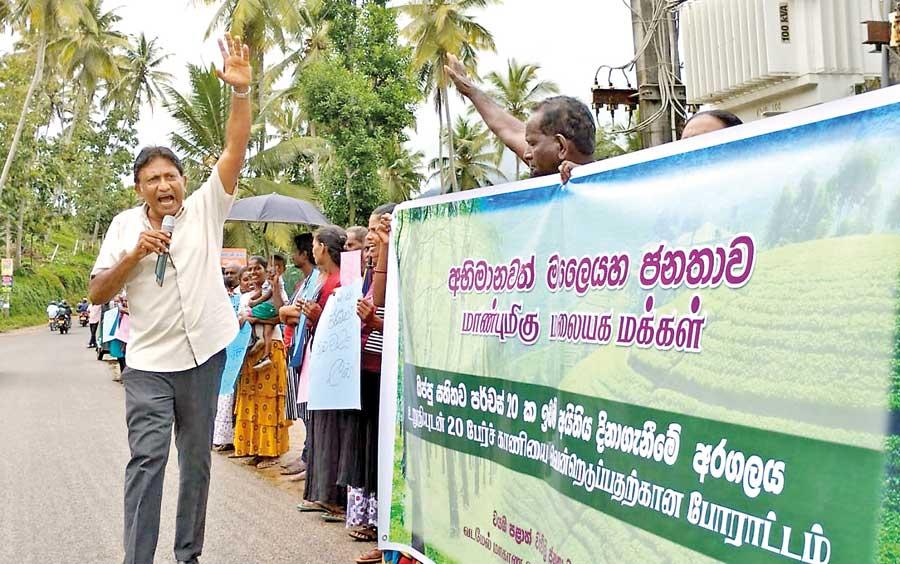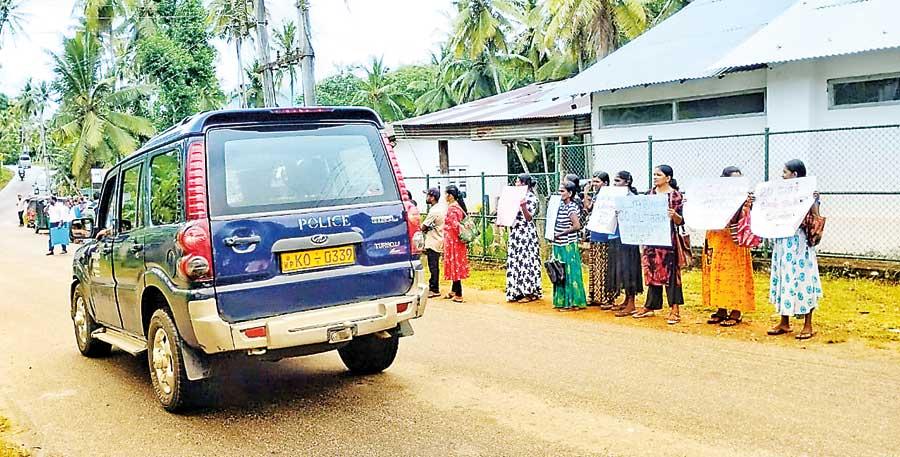17 Oct 2023 - {{hitsCtrl.values.hits}}
- More than 200 Malaiyaha community members participated in this protest which was held at the entrance to Pituwakanda Estate, on Rambukkana Road, Mawatagama
- Social activists maintain that the government is silent when it comes to issuing rights to lands concerning the Malaiyaha Tamil community
- It is highlighted that members of this community aren’t enjoying equal rights when compared to members of other communities in the island

Protestor Sendhil Sivanayam shouts slogans as he throws his weight behind a protest in Mawatagama in support of finding solutions to the rights issues of a marginalized Tamils, which identifies itself as the Malaiyaha community
The Malaiyaha community-whose members are employed in several estates in Mawatagama- staged a protest on October 5 demanding that their families having a history of living in this island for 200 years be given lands spanning 20 perches and also rights to them.
October 5 demanding that their families having a history of living in this island for 200 years be given lands spanning 20 perches and also rights to them.
More than 200 Malaiyaha community members participated in this protest which was held at the entrance to Pituwakanda Estate, on Rambukkana Road, Mawatagama. About 100 other members of this community were remotely involved in similar protests and threw their weight behind the efforts to secure their rights.
Social activist and Executive Director of Institute for People Engagement and Networking Jeevaratnam Suresh, who participated in the protest, said that there are more than 11000 members in the Malaiyaha community in the North Western province and that the locals are conducting this protest demanding plots of land, so that they can create an environment where they can live in.
Suresh stressed on the rights to such land. “When we go back to the history of Malaiyaha Tamil Community in Sri Lanka they have no history of having rights to lands that have deeds. Especially in Sri Lanka several ministries- including the Ministry of Plantation- has provided small lands to the estate people sans deeds. We know that a deed for a land comes with a legal document. Also we know that lands of estate workers belong to the government. And these are monitored by the Regional Plantation Companies. Therefore it is obvious that the estate workers don’t own these lands,” added Jeewaratnam.
 This social activist also opinioned that the government is silent when it comes to issuing land rights to the Malaiyaha Tamil community. He harboured doubts regarding this matter associated with land because this community has lived in this country for 200 years. Above all he mentioned that these estate workers are indirectly contributing to the country’s economy: an act which is not witnessed by most people. He spoke on behalf of the Malaiyaha Tamil community and stated that members of this community aren’t enjoying equal rights as members of other communities in the country. He also affirmed that they were conducting such protests throughout history. The only thing he requests is equal rights.
This social activist also opinioned that the government is silent when it comes to issuing land rights to the Malaiyaha Tamil community. He harboured doubts regarding this matter associated with land because this community has lived in this country for 200 years. Above all he mentioned that these estate workers are indirectly contributing to the country’s economy: an act which is not witnessed by most people. He spoke on behalf of the Malaiyaha Tamil community and stated that members of this community aren’t enjoying equal rights as members of other communities in the country. He also affirmed that they were conducting such protests throughout history. The only thing he requests is equal rights.
Sendhil Sivanayam, a participant at the protest, expressed his views regarding the plight of this community. He explained the aim behind the protest and mentioning that the people of this community are looking for rights to lands. He requested from both the authorities and the government to ensure that the workers are paid a decent salary.
“Today is a very important day in Mawatagama, Northwestern area. The estates in this area are cultivating tea, rubber and coconut. The workers in the plantation sector face problems which are associated with the rights to their lands. Now each family is expecting a twenty perch land; especially not only the land, but a housing system, infrastructure and other facilities too. The salary of these workers is worth only 1000 rupees; which is not enough to make ends meet. And the irony here is that these people are the ones who contribute to bring dollars to the country. Such people are earning only a very small income,” added Sivanayam.
He also focused his attention on the education sector in this community.
“There is a big issue in the plantation sector. There is a considerable shortage of teachers teaching Science and technology. Another issue is the infrastructure system in this plantation sector not being in order. The line rooms are 200 years old, there is no proper supply of water to these people and the roads are in a dilapidated condition ,” added Sivanayam.

Policemen on a vehicle keep a keen eye on people protesting in the estate sector
09 Jan 2025 29 minute ago
09 Jan 2025 2 hours ago
09 Jan 2025 3 hours ago
09 Jan 2025 3 hours ago
09 Jan 2025 3 hours ago